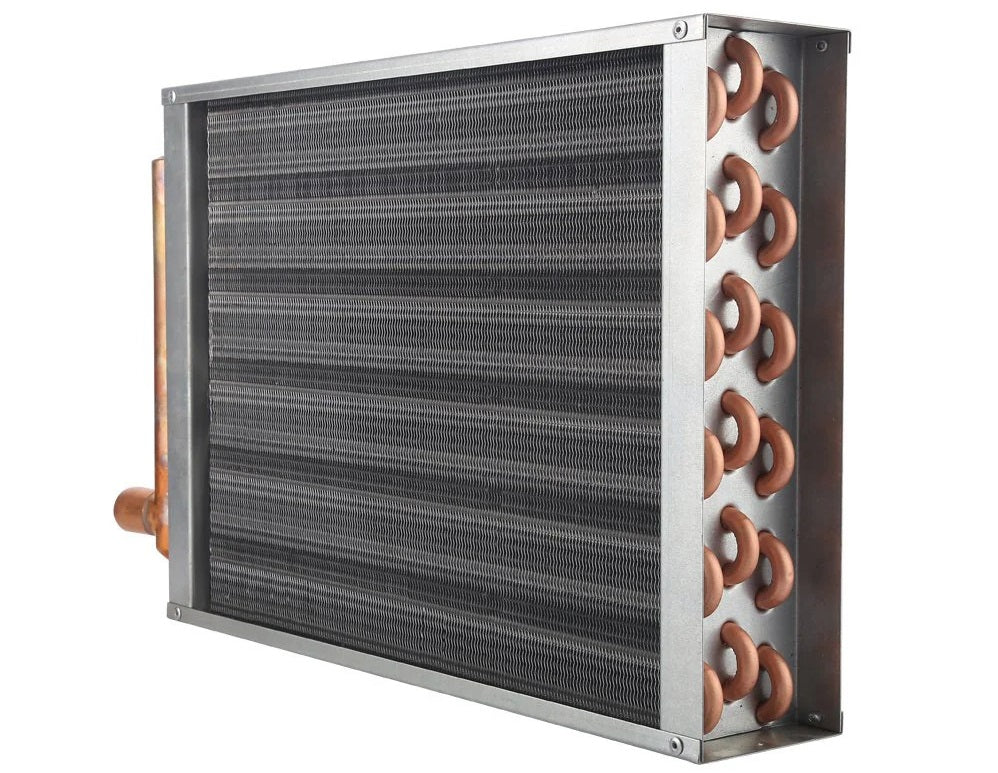Air-to-water heat exchangers are essential for heating and cooling homes, businesses, and industrial settings. They transfer heat between air and water efficiently, making them versatile and useful in many systems. This guide explains how these devices work, their components, and their wide range of applications. Understanding their functionality and benefits can help you decide where and how to use them effectively.
How Do Air-to-Water Heat Exchangers Work?
An air-to-water heat exchanger uses a simple but effective process to move heat from one medium to another. Heat is transferred between air and water through conductive materials like aluminum or copper. The key principle behind this is heat transfer, where heat naturally moves from warmer to cooler substances. Here’s how it works:
- Fans pull air over coils containing water or another liquid.
- The liquid absorbs or releases heat depending on the system’s purpose (heating or cooling).
- The newly heated or cooled water is then circulated to other system parts.
For example, warm air transfers heat to the water in heating mode. The heated water can then be used to warm floors or radiators. The process is reversed in cooling mode, cooling the water to provide air conditioning. This process ensures high energy efficiency in HVAC systems, keeping spaces comfortable and energy costs manageable.
Discover our most popular product categories – find what you need today!
- Air to Water Heat Exchangers
- Water to Air Heat Exchangers
- Plate Heat Exchangers
- Oil Coolers & Intercoolers
- Tankless Water Heaters
Essential Components Explained
The effectiveness of an air-to-water heat exchanger depends on its components. These parts ensure smooth operation and efficient heat transfer:
- Heat exchange coils: Typically made of materials like aluminum or copper, these coils allow heat to move between air and water.
- Fans: Fans draw air across the coils, ensuring consistent airflow and optimal heat transfer.
- Water circulation system: Pumps move water through the coils, enabling continuous operation.
Some systems also include temperature control units, which monitor and adjust performance for optimal results. These components make air-to-water heat exchangers reliable for heating and cooling in various settings. Regular maintenance, such as cleaning the coils and ensuring proper airflow, helps extend the system's life and maintains energy efficiency.
Residential Heating and Cooling
For homeowners, air-to-water heat exchangers are a practical way to maintain comfortable indoor temperatures throughout the year. These systems can be integrated with radiant floor heating, baseboard heaters, or fan coils, making them versatile for residential use. Key benefits include:
- Energy efficiency: These systems reduce energy consumption and lower utility bills by reusing heat.
- Quiet operation: Unlike traditional HVAC units, air-to-water systems are quieter, making them suitable for living spaces.
- Easy integration: These exchangers can be paired with existing boilers, heat pumps, or solar systems.
Homeowners often choose these systems because they are cost-effective and easy to maintain. They’re especially popular in regions with varying climates, as they provide consistent heating and cooling without requiring multiple separate units.
Commercial HVAC Applications
Air-to-water heat exchangers are often a core component of HVAC systems in commercial buildings. These systems help maintain a controlled indoor environment for businesses, ensuring employee comfort and equipment safety. Benefits in commercial use include:
- Scalability: Suitable for large or small spaces, including office buildings, hotels, and shopping centers.
- Reduced operating costs: High energy efficiency translates to significant savings over time.
- Reliable performance: These systems can handle continuous operation, making them ideal for busy environments.
In addition to maintaining comfortable temperatures, these systems can improve air quality by controlling humidity and circulating fresh air. Air-to-water heat exchangers are an invaluable solution for industries like healthcare or technology, where precise temperature control is critical.
Industrial Uses
Industries often require precise temperature control for machinery and processes. Air-to-water heat exchangers play a significant role in these applications. Some common industrial uses include:
- Manufacturing: Maintaining specific temperatures for machinery or production lines.
- Chemical plants: Cooling or heating liquids used in chemical reactions.
- Power generation: Helping manage heat from turbines or generators.
These systems are designed to handle high loads and consistently perform in demanding environments. Their robust design and reliability make them a preferred choice for industries that rely on efficient heat transfer.
Working with Renewable Energy Systems
Although air-to-water systems aren’t exclusive to renewable energy, they work well with solar and geothermal systems. When paired with these technologies, they enhance energy efficiency, offering homeowners and businesses a way to cut energy costs further. Key advantages include:
- Supporting renewable energy by utilizing heat generated from solar panels or geothermal sources.
- Reducing reliance on traditional heating and cooling systems.
- Providing flexible installation options for both new constructions and retrofits.
This compatibility makes them attractive for those looking to increase efficiency and lower energy consumption.
Maintenance for Longevity
Regular maintenance is essential to keep an air-to-water heat exchanger running effectively. Some simple steps to follow include:
- Cleaning the coils: Dust and debris can block airflow and reduce efficiency.
- Inspecting the fans: Ensure fans are functioning correctly to maintain consistent air movement.
- Checking for leaks: Addressing leaks in the water circulation system quickly prevents further issues.
These systems are relatively low-maintenance, but routine checks can significantly extend their lifespan and ensure reliable performance. Investing in proper care ensures that your cooling technology continues to deliver excellent results for years.
Why Consider Air-to-Water Heat Exchangers?
Choosing an air-to-water heat exchanger means investing in an efficient, versatile, and reliable system for heating and cooling. Whether for residential comfort, commercial use, or industrial applications, these systems offer:
- Enhanced energy efficiency.
- Seamless integration with existing HVAC systems.
- Reliable performance across various settings.
Understanding their functionality and applications lets you decide if this technology is right for your needs.

